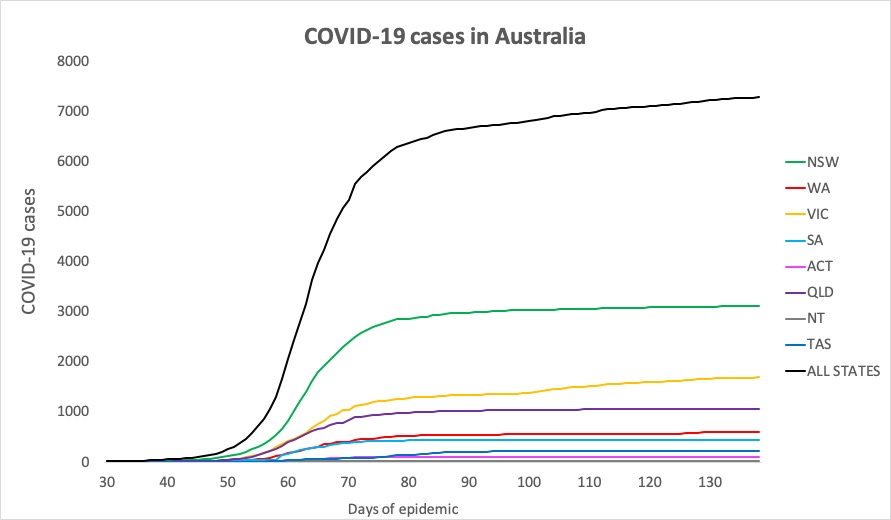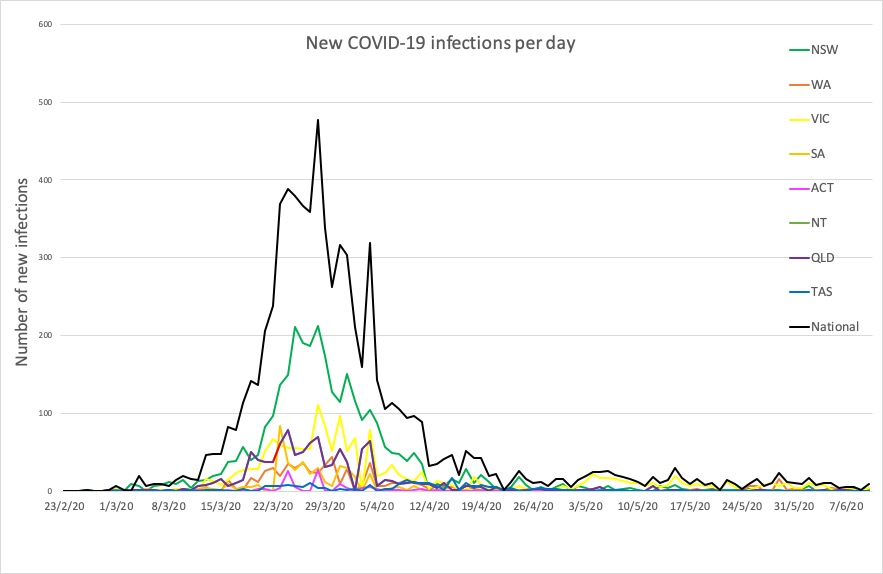The obesity pandemic has exacerbated the COVID-19 pandemic, say the authors of an editorial in the BMJ which argues the food industry needs to take greater responsibility for the severity of COVID-19.
Welcome to The Medical Republic‘s live COVID-19 blog.
Got any tips, comments or feedback? Email me at bianca@biancanogrady.com
The latest
- Afternoon update: Advice on telehealth consultations requiring an interpreter, and the food industry cops an editorial hiding for contributions to obesity and COVID-19 severity.
- Morning update: Privacy and effectiveness concerns dissuade some from COVIDSafe app, and Australian hydroxychloroquine trial forges ahead despite UK results.
- Today’s updated COVID-19 infection figures for Australia.
- The obesity pandemic has exacerbated the COVID-19 pandemic, say the authors of an editorial in the BMJ which argues the food industry needs to take greater responsibility for the severity of COVID-19.
“The obesity pandemic is the result of living in food environments where it is difficult not to overconsume calories,” wrote the editorial’s authors, from Barts and the London School of Medicine and Dentistry. “The global food industry produces and extensively promotes cheap, sugar sweetened beverages and ultraprocessed foods high in salt, sugar, and saturated fat that provide only a transient sensation of fullness.”
They cited numerous studies linking overweight and obesity to more severe COVID-19 and greater mortality from the disease, and called for across the board reductions in salt, sugar and saturated fat.
“The toll of morbidity and mortality from COVID-19 has made this more apparent and more urgent than ever.” - Do you have patients from non-English-speaking backgrounds who require an interpreter? The RACGP has published some guidance on telehealth consultations where an interpreter is needed, which covers questions such as how to set up a conference call for telehealth, how to book the appointment, and how to start and end the consultation.
- Privacy concerns, technical problems, and doubts about the COVIDSafe app’s effectiveness are the main reasons many Australians refused to download the app, according to a survey published on the non-peer-reviewed preprint server MedRxiv.
A national, cross-sectional survey of 1500 Australians – excluding healthcare professionals and people who had or thought they had experienced COVID-19 – found 37% had downloaded the app, 19% intended to download in, 28% refused to download it and 16% were undecided.
Among those who refused to download the app, or who were still on the fence about it, one quarter said their concerns about privacy was their main reason for not downloading it, and one quarter said they hadn’t or wouldn’t download it because they felt their phone was too old or had data or storage limitations. However one in six said they wouldn’t because they felt social distancing was enough for them, and 7% also questioned whether the app would be effective.
However three-quarters of participants agreed that the app would help contact tracing, and would help inform people who had potentially been exposed to COVID-19.
The survey also highlighted some confusion about how the app worked, with nearly three-quarters of respondents incorrectly believing the app would alert them when someone with COVID-19 was nearby. - The Australian hydroxychloroquine trial – ASCOT – is still going ahead despite preliminary data from the UK-based randomised controlled RECOVERY trial suggesting no significant improvements in 28-day mortality in patients hospitalised with COVID-19.
In a statement, the ASCOT steering committee acknowledged the recent withdrawal of the observational study published in the Lancet using data from the controversial data company Surgisphere. But they have decided to continue recruiting until the full results from the RECOVERY trial are published, saying there is “great benefit” from having data from more than one trial in deciding the role – if any – of hydroxochloroquine in the treatment of COVID-19.
They also pointed out differences between the RECOVERY and ASCOT trials, in that ASCOT has tighter eligibility criteria, safety protocols including regular ECGs, and recommendations around contraindicated medications.
- Here are the latest confirmed COVID-19 infection figures from around Australia, with only nine new cases in the 24 hours to 9pm yesterday:
National – 7276, with 102 deaths and 6744 recovered
ACT – 108
NSW – 3117
NT – 29
QLD – 1062
SA – 440
TAS – 228
VIC – 1691
WA – 601




